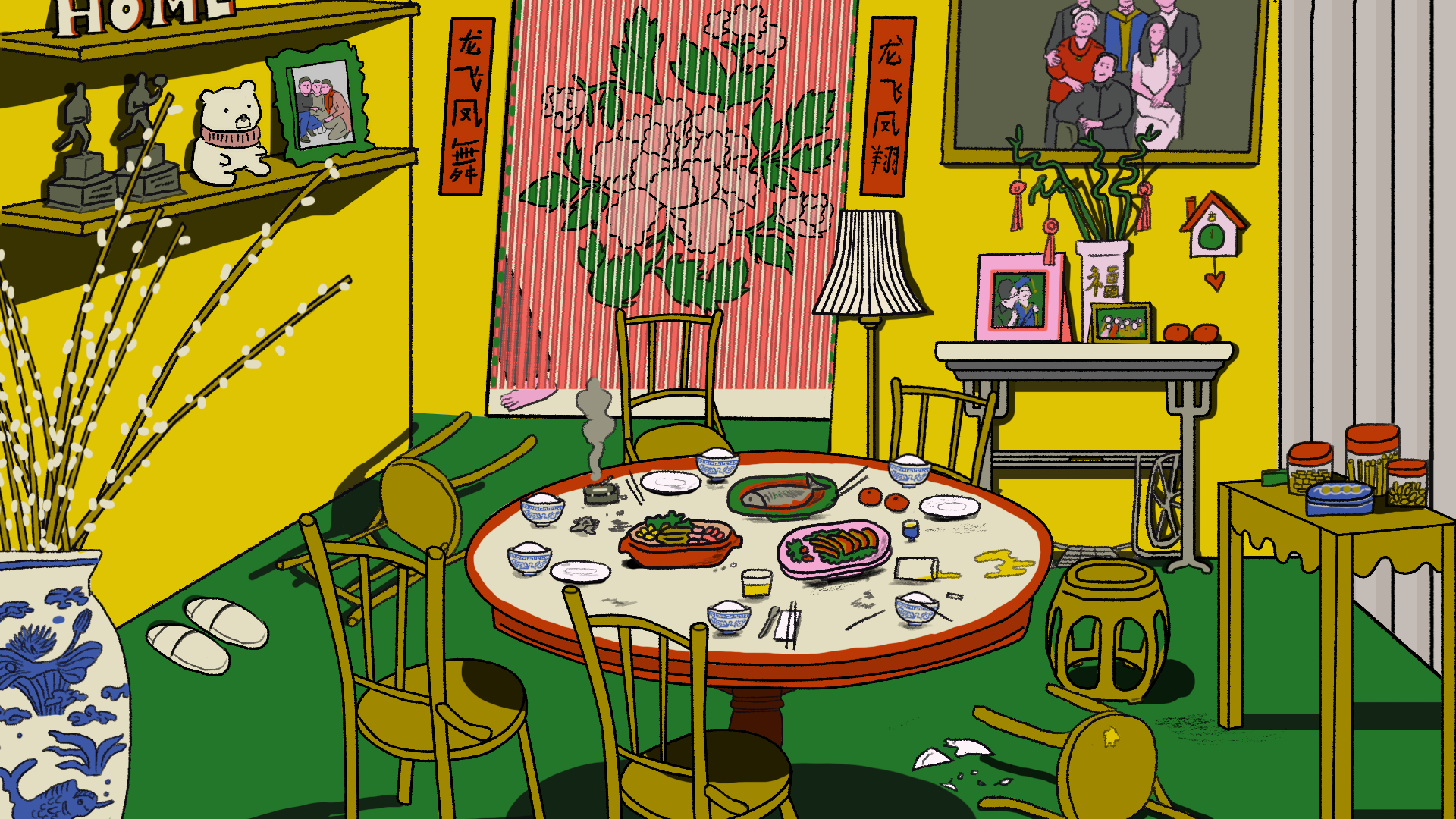In the closing sequence of “Extended Love| A Chinese New Year Short Film”, a group gathers for a photograph. Enveloped in loving familiarity, everyone is smiling and laughing. It’s a picture-perfect representation of multicultural Singapore: an Indian woman sporting the obligatory pottu, and a bearded Malay man holding a rainbow-coloured agar-agar jelly cake. (A subtle nod to the queer community, perhaps?) As the film ends, Ah Ma, who orchestrated this annual gathering at her neighbourhood cai png (mixed rice) stall, turns to her granddaughter Adeline and says: “Even the most flavourful meal can never compare to the richness of relationships.” Adeline is moved to tears. She has travelled from distant shores, where she migrated with her parents, to persuade her grandmother to join them. But Ah Ma is clearly content here, with members of her chosen community. These reunion dinners have become a tradition, shaped by choice and circumstance.
Released in February last year, the three-minute Royston Tan-directed short for gov.sg extends the idyllic vision of the annual Chinese New Year (CNY) reunion dinner beyond familial lines. It’s an opportunity to share unbridled communion and joy not just with kin, but with found friends too. While we can appreciate the potentialities of this tradition and festival in a multicultural society, this utopian vision runs counter to the lived realities of many Singaporeans. Unlike the apocryphal Ah Ma, these individuals don’t always have a community to fall back on. Instead, they’re faced with the daunting prospect of spending Chinese New Year with families they would rather avoid.
Ironically, this pressure to conform stems partially from decades of state-driven messaging. New Naratif, a movement promoting democracy in South-east Asia, has suggested that the ruling People’s Action Party-led government has deliberately constructed Singapore’s concept of the traditional, heteronormative nuclear family in order to forge a distinct national identity grounded in their definition of “Asian values”. Safeguarding this ideal, it argued, was essential to providing citizens with purpose and stability. From a young age, we’re told that family is the basic unit of a community. This notion feeds into the constructed reality that the heteronormative family that stays together (and eats together) is the cornerstone of a peaceful and stable society. In this version of reality, Chinese New Year is the time when this idea is reified; thousands of reunion dinners across the island breathing fresh life into familial bonds. There is of course, a strong cultural element at play too. Societies influenced by Confucianism tend to emphasise family, especially the idea of “filial piety”, as the basis for individual and social harmony.
Other realities—how we celebrate these occasions, where we celebrate them, whom we celebrate with, and whether we eschew celebrations altogether—are unable to break free of this socio-political straitjacket to find wider acceptance.
This conception of a “normal” Asian family, however, has changed over time. Many Singaporeans, for instance, have been shunning traditional, family-oriented celebrations for years, preferring to travel instead. When I ask friends why a holiday is more important than hongbaos and family time, I’m frequently greeted with an awkward silence. Turns out, there’s another silence that they can’t handle—the unbearable silence of CNY gatherings. For many, the new year is a time when they are expected to keep up appearances while setting aside unhealthy family dynamics, often rooted in unresolved childhood conflict, that manifests as parental favouritism, sibling rivalry, narcissism, gaslighting and bullying.
Singaporeans aren’t alone in pushing back against widely accepted traditions and narratives of family and merry making. Youngsters in China are cutting ties with their relatives and boycotting important Chinese festivals like the Mid-Autumn Festival in increasing numbers. They feel emotionally disconnected from overbearing relatives, who compare and judge their life choices. They’re also tired of playing the trophy child, so their parents can boast about their accomplishments to extended family.
China and Singapore appear to be in the midst of a cultural and societal shift, where focus on the individual is gradually eclipsing the collective; younger generations are exercising their personal freedom—choosing to centre their own self-care and emotional well-being. This can foster social cohesion in two ways. Firstly, distance, rather than a forced coming together, can actually improve intra-family bonds. Secondly, the normalising of “stepping away” can create space for those who, for whatever reason, may never be a part of the idealised nuclear family that we have been told is the basic building block of society.
To help get a sense for these dynamics, three Singaporeans agreed to share their stories under pseudonyms. Rather than ask them, “Where are you running to?”, when boycotting Chinese New Year, I thought the more revealing question would be: “What are you running from?”
“My siblings were jealous of my success, and I felt bullied into caring for my sister,” said Elaine. Elaine used to own a business, and has spent her retirement caring for her sister, who has schizophrenia. Her brother had lived with their late mother, and her elder sister was bedridden. “My mother was difficult and favoured my brother to no end. I even remember asking her point blank whether I was truly hers!” Elaine recalled neither joy nor laughter at the dinner table, just silence at best. “We never took any reunion dinner photos,” she lamented. The silence Elaine experienced at CNY gatherings only amplified her sense of loneliness and of being disconnected from her family. Eventually, she stopped attending reunion dinners. Instead, she sent food to her family on the eve of the holiday, preferring to watch Korean dramas over dinner, with her cats for company.





